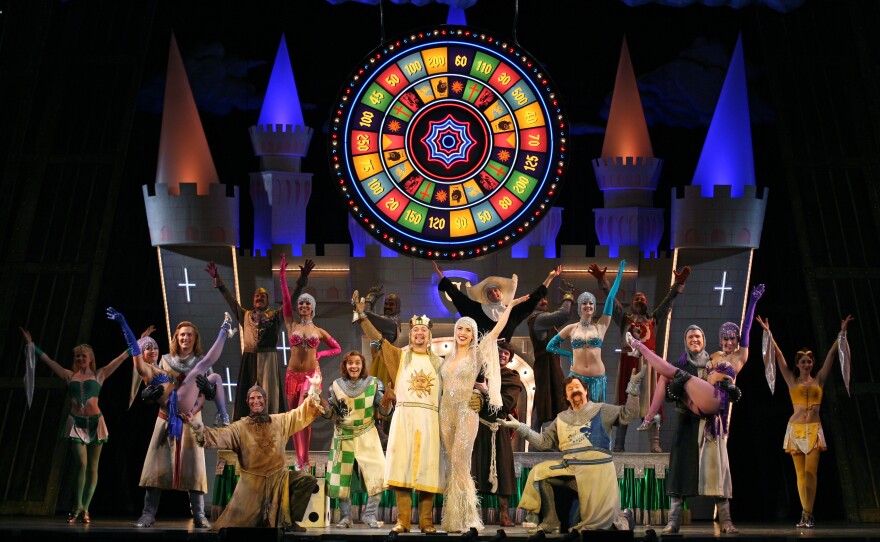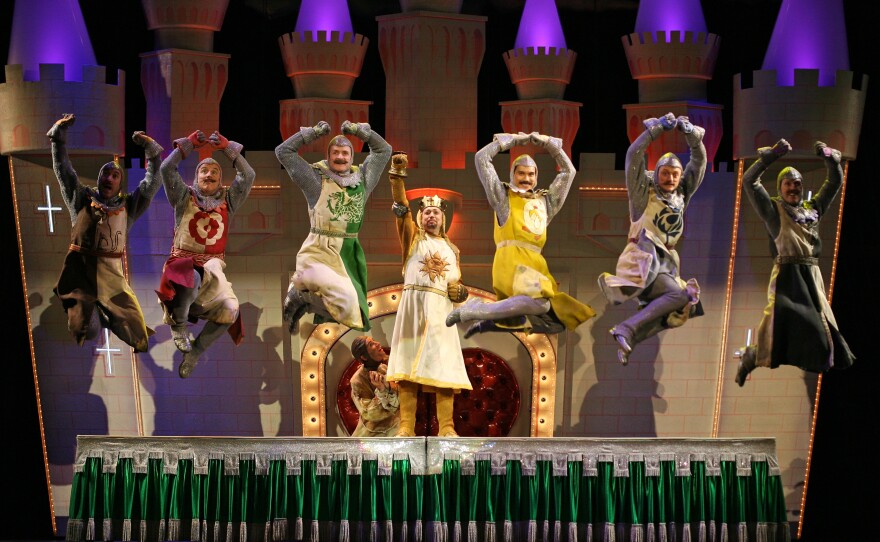Okay, "Spamalot" (running September 8 - 13 at the San Diego Civic Theater) is not a movie but since it's based on a movie and from my beloved Pythonites I figure it's fair game to cover on Cinema Junkie. And if you have a problem with that there's an argument clinic I know that I could send you to...
Check out the behind the scenes video about "Spamalot," and listen to my call with Mrs. Galahad, Dennis' mum (and with a little help from Christopher Gurr)..
I had hoped to catch "Spamalot" on Broadway when it first opened with Tim Curry as King Arthur, Hank Azaria as Lancelot, and David Hyde Pierce as Sir Robin -- what a fun cast! But tickets were so expensive that I decided to wait. Little did I know how long that wait would be. The play went to Vegas where it was truncated (either because Vegas doesn't believe people can watch a show for more than an hour or because they didn't want to keep you from gambling) and given an exclusive run forbidding any theater in the southwest region to have a run of the show. But my wait is finally over. I got to see the play up in L.A, this past weekend and now it comes down to San Diego for a brief engagement.
When I first heard that Monty Python's "Holy Grail" was to be made into a Broadway musical, I had a moment of panic. But I shouldn't have since it was to be Pythonite Eric Idle who would oversee the translation from film to stage (with help from composer John Du Prez). Idle has always had a flair for music -- remember he did the TV movie "The Rutles: All You Need is Cash." He also composed many of the Python's funniest musical moments including "Sit on My Face and Tell Me That You Love Me" and "Always Look on the Bright Side of Life," which ends "Life of Brian" and is recycled in "Spamalot." So "Spamalot" allows Idle to pursue his love of the musically ridiculous unhindered by the other Pythons. If you are a Python fan, you're sure to enjoy the show and its references to Python movies and TV shows. If you don't know Python, you won't have any trouble following along and having a great time. The catapulted cow and killer rabbit alone are worth the price of admission.
Some have criticized Idle for exploiting Python and not all the Pythons have given the play their rousing approval. But Idle has met with the criticism in fitting Python fashion, referring to himself as a "greedy bastard." The play is not Monty Python but it has Python gags that still play well and it allows Idle to creatively romp in the musical format and treat it with the same irreverence that the Pythonites bestowed on everything from the military to the British working class to the Queen herself. "Spamalot" is not really Monty Python's but it's still fun and it's very much a display of Eric Idle's particular brand of humor. In a way the title says it all -- it's kind of a SPAM version of Monty Python, taking bits and pieces of other things and pressing them altogether to create something new.
The play wastes no time getting laughs. There are even jokes during the overture and the conductor engages in some of the comic bits as well. The play opens with a professor explaining English history and King Arthur's place in it. Then there's a silly Finnish number that stands in for the subtitle jokes from the opening credits of "Monty Python and the Holy Grail." No jokes in the play about "a moose bit my sister" (diehard fans should remember that) but there is unbridled lunacy with a Finnish song and dance that incorporates the fish slapping skit made famous by Michael Palin and John Cleese. There are a few quick references to other familiar Python skits. Later the not yet dead talk of going to war "in suspenders and a bra" referencing "The Lumberjack Song." The audience I saw the play with was so primed to laugh that they were laughing before the jokes were even told. Just seeing a knight of Ni or the Black Knight had people cracking up.
Set designer and costumer Tim Hatley deserves special praise for a clever and impressive set, and fun costumes. Camelot looks like a cross between Vegas and Sleeping Beauty's castle at Disneyland. The set transforms from battlements for the snooty French to a "very expensive forest" with ease. The Lady of the Lake gets a stunning little outfit that goes from sexy gown to white wedding dress with a mere flip of the arms while the Knights of Ni get some impressive head gear. And I don't know who's responsible for the catapulted cow, killer rabbit, and Black Knight limb slashing but all three were well executed and hilarious. It's not often that a set plays such a pivotal role in making the comedy play better.
The production of "Spamalot" I saw in L.A. had John O'Hurley (Peterman from "Seinfeld") as Arthur, and Eric Idle was apparently sitting three rows in front of my parents at that final show in LA. In San Diego, Christopher Gurr takes on the role of King Arthur. I had a chance to speak with him about performing in the play, which must have had some special irony since he's directed "Camelot" before. I'll be talking about Python and "Spamalot" on These Days this Thursday September 10th at 10:00am. In the mean time enjoy my interview with Gurr. I'll post my interview with actor Ben Davis (Sir Galahad and the Black Knight) tomorrow.

You play more than one character in the play. So who are you?
CHRISTOPHER GURR: I have been the King and I have also been Mrs. Galahad, Sir Bedevere and Concorde. That’s one Eric Idle role and two Terry Jones roles.
So how do you compare playing the different characters? Is there a different style for each of the characters based on which of the Pythonites originated the roles?
CG: Oh absolutely you can tell when you are playing a Terry Jones role or an Eric Idle role, it’s built on them. The Terry Jones role that I’ve played before, Mrs. Galahad, is an example of their pepper-pot roles, sort of screechy, Cockney women that they all did, all the boys played them at some point but Terry was sort of the King or Queen as it were of those particular roles. But yeah I think there is a shift from Python to Python. There is a difference in style. And King Arthur is definitely a Graham Chapman role, he was the specialist in playing the authority figure and sort of the straight man.
Now in terms of playing Mrs. Galahad, the Pythonites had a way of playing women that was so funny in part I think because they didn’t try to make themselves look all that good.
CG: It’s true, as a matter of fact I keep a portrait of Terry Jones on my dressing room table just to sort of remind me whose work I’m really doing here that I’m standing on the shoulders of giants and it’s a picture of him dressed as a very homely house frau but as you say not a lick of make up on. It’s Terry Jones wearing a dress is what it is.
Part of what I’d like you to do is talk about the style of comedy that is Python. So in terms of Mrs. Galahad how do you tackle that? How do you get into that role? What is the quality of comedy in that particular role that you are trying to hit?
CG: She is probably the broadest of the characters that are presented on stage in terms of the ones I’ve played but at the root of all of them basically -- and this is a truism of comedy, not stand up comedy, but when you are playing a comedic character -- you gotta tell the truth. You have to tell the truth. The truth may be an extreme situation but you have to be telling the truth. If you are going out there to be wakka-wakka-funny in Pythonland that really doesn’t deliver the goods. There’s probably the greatest distance between Mrs. Galahad and the truth of the audience, and that’s what I have to bridge, but if I don’t absolutely believe that she thinks she’s the most normal thing on the face of the planet then I fail in that role.
As Mrs. Galahad you are more overtly going for laughs and as Arthur you probably end up being straight man a little more often, so as a performer how do you work with that?
CG: The mindset is only slightly different because again when I put on the gold chain mail and the crown and Excaliber, I’m still going out there to tell the truth. Now it’s a different truth. It’s the truth that I believe that I’m Arthur King of the Britons and that everyone should treat me accordingly and of course the comedy of the show comes from the fact that no one treats me accordingly. But it’s a different thing to be a straight man, your sense of what you’re listening to in terms of timing, how the laughs are coming off the audience, and when you’re going to say your next feed line so the next punchline can happen, it is a slightly different kind of listening that you have to do when you’re doing that sort of role.

Talk a little about the style of comedy that is Python – there’s slapstick and sight gags yet these are all highly educated guys and there’s more going on that we may realize.
CG: Oh yeah it’s one of the reasons you can revisit Python material over and over and over again because the things that made me laugh at it when I was thirteen were different than the things that made me laugh at it when I was 42. They all went to either Cambridge or Oxford. Smart, smart boys. One of the main things about the Python humor -- and you have to remember that their anniversary is the exact same anniversary as Woodstock -- so they were responding to a lot of the same things that things like Woodstock were responding to. So it’s anti-establishmentarianism, to use a big old fancy word. And that means that a lot of their comedy is about knocking the legs out from under authority figures whatever that authority figure is, and "Monty Python and the Holy Grail" is a huge example of that because basically that’s all it’s about, knocking King Arthur down and he keeps getting up, and you knock him down and he keeps getting up. I used to find that it was a mean-spirited comedy but the older I get -- and perhaps I’m just getting meaner --I don’t find it that mean any more. This particular show is sort of a hybrid, Eric Idle has been very smart. He made it not pure Python and it’s not Python-like either, it’s certainly a mix of Python's sensibility of comedy and a pop American culture sense of comedy and a musical theater sense of comedy. So it’s sort of a mélange if you will of those three things.
How do you think Eric Idle has translated it to the stage? If you were sending someone who never saw Python before, what kind of a primer would you give them, are there certain sketches they should see?
CG: No not really. And that’s been one of the great joys of performing the piece because every night we go out there and we do the piece for three different groups of people who are scattered throughout our audience: Python fans; musical theater fans, who get all the sort of jokes about musical theater; and then people who don’t have either one of those reference points also make their way into our audience. And we get different laughs from each of those groups. I think in no way do you need a primer to get the show.
And who was the other character that you play.
CG: Sir Bedevere, who’s the inventor of the wooden rabbit, he’s sort of the intellectual or pseudo-intellectual of the knights. And Concorde, he’s the one who takes the arrow in the chest.
So talk about the intellectual of the bunch.
CG: Sir Bedevere, he’s probably the knight who takes himself the most seriously and in fact is the doofiest of the knights and any time he is turned to for help it sounds like he knows what he’s talking about but then it turns out that he doesn’t. It’s the sort of thing I have to suspend in my mind every night when he goes off to get the wooden rabbit. He’s built himself a Trojan horse but it’s in the shape of a large rabbit and my thought is that what happened is that Bedevere read the story of the Trojan horse, he just didn’t turn to the last page to see what happened. He just thought “Oh that’s an excellent idea,” and off he went to build a wooden rabbit not knowing how the whole thing was supposed to work out.
In terms of playing King Arthur, what’s the key to getting that authority figure but still keeping the audience on your side because for Arthur there’s this sense of building frustration.
CG: Yeah that’s true. You’ve laid your finger on one of the big traps of the role and I constantly have to watch myself because if you get too irritated you are yourself irritating and the audience won’t stick with you. And for better or for worse, Arthur is your point of view man the whole time, it’s him that you’re following through the story. It’s tricky and that’s one of the questions that I’m asking myself in my head all the time. In the second scene have I already gotten to 9 in terms of an irritation level because you can’t let yourself do that. Like driving a car, you’re always testing where your foot is on the gas, and that never becomes rout like I’ve locked in my performance so I know exactly where I want to be on the scale of irritation on this particular line and thank god for that because it would be boring as hell to perform it that way and every now and then I get a note from the stage manager saying you were a little snarky with the peasant in that scene or you were a little too patient.

Is there a difference between playing the comedy when it’s strictly written and verbal and when it’s sung?
CG: The big difference of course is when if you are only speaking it and it is not set to music is that you and you alone are in charge of the time, and when you are singing it, you are influencing the time but the maestro is also in charge of the time and even all the members of the pit band are in charge of the time so it really gets collaborative when you’re singing it. But if you’re fortunate like we are, you have a maestro who understands comedy.
Mike Nichols directed the play, he would not be my immediate choice to direct something Python related. How did his approach to comedy fit in with the Python style?
CG: I agree when I heard he was directing I thought like really? But one of the brilliant things about Mike Nichols is if you line up all his work none of it is exactly alike, He tends to remake himself every time. The thing I think is most obvious with "Spamalot" is the tension between Eric Idle’s sense of comedy and Mike Nichols sense of comedy. And I don’t think the show would have the legs it has without that particular dynamic. And because they are both really good at their jobs and frankly legends we have two giants at work together, no one overpowers the other. Mike’s big, big presence with us, constantly, almost always it’s about his core note which is you’ve got to bring heart to this, you have to tell the truth, even though it’s an extreme truth, and his big, big thing which is hard to hear as an actor, which is "You are not funny, the material is funny." And you go whoa! Egos and actors, we tend to have them, it’s a hard thing to take to heart but intellectually I know that it’s absolutely right.






